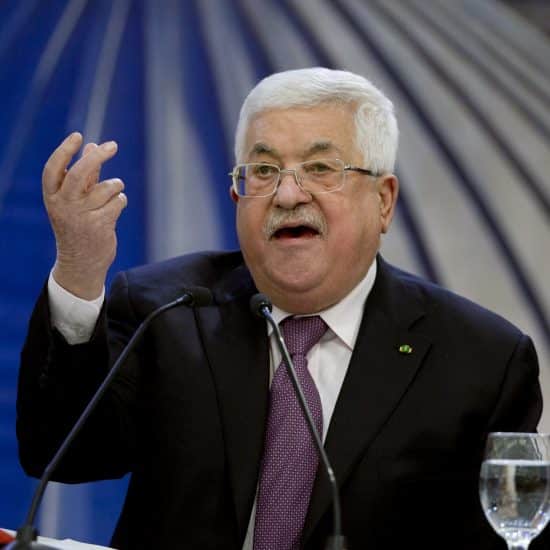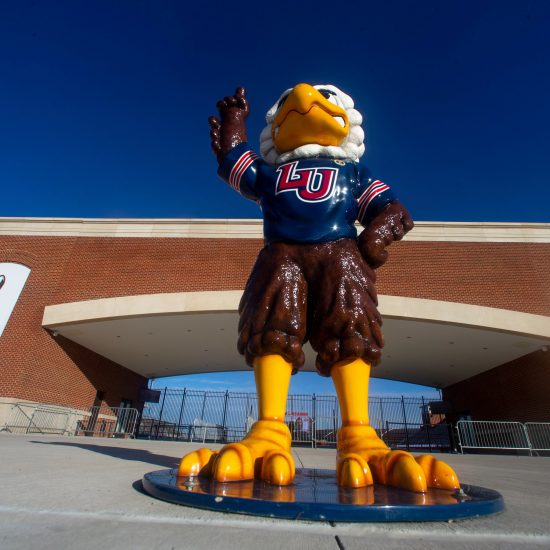BOLIVAR, Mo. — When Southwest Baptist University President C. Pat Taylor handed a diploma to Minda Cox at spring graduation, every student, faculty and staffer’s hand invisibly reached to grasp it with her. Because she wouldn’t have earned it without them, she is quick to point out.

Minda Cox (right) teaches Malebogo, a young Batswanan, how to feed herself shortly after Malebogo lost her limbs to a staph infection. Minda ministered to and with the disabled in the African country as part of her intercultural studies degree program at Southwest Baptist University in Bolivar, Mo. (Photo courtesy of Minda Cox)
|
Minda considers herself “ordinary.” A native of India, she was born without arms and legs, and likely wouldn’t have had many opportunities. Instead, nurse Catherine “Cathy” Cox adopted her as the youngest of five children — all from overseas, including Brazil and Haiti, and most with a health issue. One daughter is blind, and another was born with spina bifida.
Cox, now pastor of St. Alban’s Episcopal Church in Bolivar, taught her girls to live life unafraid and as fully as they could, to open up even to strangers. “To some extent they will always be dependent on others,” she explained. “I taught them to be outgoing.”
“We were never kept in the house,” Minda added. “We went everywhere.”
Her oldest sister, also an SBU graduate, lives in Bolivar and has adopted six children, many with special needs.
Not only did Minda complete an education. God used SBU’s people to teach her life principles and to help reveal his direction for her in missions. SBU taught her she is “just like all my friends.”
Calling each person’s story a “different experience of the one great God-story,” Minda was the senior speaker for the graduating class. “Mine is just one example of a life that has been shaped and directed because of spending a few years in this place, surrounded by people who love God — and who have loved us with his love,” she told the crowd.
Openness to others and willingness to ask for and accept help when she needs it provided opportunities that Minda and her mom might not have considered — a bachelor of arts degree in intercultural studies and speech communications/theatre, a part in a university theatre production, the SBU Life Beautiful Award and six months of immersion in Botswana.
Homeschooled, Minda figured out how to manipulate first markers and then brushes between her chin and shoulder to express herself through painting. Art brought her first encounter with SBU when she became a student of artist Emily Frost, wife of intercultural studies director Jim Frost.
Emily Frost encouraged her student to take the GED. She challenged — take the GED or give up lessons.
Minda wasn’t about to let go of her art voice, not only earning a GED, but also taking a class at the university. Soon she had racked up 17 college credits, including an intercultural studies course.
Then Stephanie Miller, SBU vice president for enrollment management, challenged Minda to apply as a degree-seeking student or, otherwise, she couldn’t continue.
Jim Frost backed up Miller’s proposal, adding that he wanted to see Minda walk the stage for a diploma. A “little angry at being pressured,” Minda stalked out of Frost’s office. “But nine minutes later” she called him and said she would try, she explained.
She chose the intercultural studies degree because of the first ICS course she took. “I had no idea God would call me to missions until that first class,” she said.
SBU allowed her all the same options as other students, even if it occasionally took a little extra persuasion. A few years ago, she accompanied a student group to the Missouri Capitol to lobby against proposed cuts in funding. She has helped with Welcome Week to assist new students to campus.
“They assumed she could do it” — anything Minda asked to do, Cathy Cox explained.
When Minda asked the theatre professor if she could try out, she was told, “of course,” even though costumes and the set had to be altered.
She went on SBU mission trips, including to the Pine Ridge Reservation in South Dakota.
But SBU administrators balked a little when Minda wanted to fulfill the ICS requirement to spend a semester immersed in another culture by doing so overseas as all the other students were doing.
At first they encouraged her to complete the six-month requirement stateside among Native Americans. “But we had lived in New Mexico and I had made one South Dakota trip,” she said.
Students, generally in pairs, are required to find a spot in which to serve and learn. “Africa is and always has been my passion,” Minda explained. And since her church participates in the Diocese of West Missouri’s partnership with the Anglican Diocese of Botswana, that seemed the natural place.
Some Botswana leaders, such as Father Mudereri of St. Peter’s Church in Mogoditshane, had already met and gotten to know Minda while visiting St. Alban’s. A family friend, Sandra Zarins, assists the Botswana diocese with educational needs and worked with the Anglicans to find a place for Minda.
Zarins also agreed to share her apartment, and Minda spent from January through July 2012 as a lone SBU student in Botswana, doing ministry, course work and an ethnography.
“She was freer because she worked with the diocese and not with an American missionary,” Cathy Cox said. “She was freer because she was not bound to one person…. It opened up a variety of opportunities.”
And Minda felt at home, so much so that she wanted to remain. “I loved the fact that you were home as soon as you got there…. I was welcomed and I became part of the family,” she explained. “You are pulled in…. You will always be part of them.”
Minda was well aware of her physical limitations, but her SBU experiences helped prepare her. Frost reminded her that her disability is her platform “and you are joyful in it.”
Malebogo was just one among many disabled individuals Minda encouraged. A doctor asked Minda to visit the young woman who had lost her limbs to a staph infection. Minda showed Malebogo, whose name means “gift,” how she eats and dresses. That first day, Minda taught Malebogo how to feed herself.
The physicians admitted they didn’t know how to teach the young woman and encouraged Minda to continue. Although her friend was afraid to go out, Minda took her to a pizza place she often frequented and to St. Peter’s daycare where she read stories and taught drama to the children.
At both places, people “immediately knew how to treat her…. That gave her so much courage,” Minda explained. By the time Minda’s experience ended, Malebogo was also drawing and writing.
God used that experience and her time at SBU to call Minda to what she sees as her life’s ministry — to return to Botswana and work with special education teachers, counselors, students, individuals and organizations that serve disabled children.
She hopes to create areas in which disabled artists would be able to display and sell their creations, and to expand opportunities to include music, drama and literary works. Accessible housing for disabled adults is also needed, and Minda plans to help develop training for caregivers.
She knows a combined effort of the Botswana government, society and the church will be required. Interest in assisting the disabled has blossomed in the last five years there. Minda wants to “be in on the ground level helping to facilitate, fund-raise and develop these ideas with the many Batswana who are already interested.”
Minda hopes to return to Botswana in six months. She must first raise enough funds to support herself, which she estimates at roughly $10,000 per year. She plans to continue creating original artwork, the sale of which helped cover college expenses and now will help fund her ministry. Interested individuals can view her artwork and contact her through her website mindacox.com.
Every few years, SBU First Lady Judy Taylor chooses and encourages a student to write his or her life story, which the university publishes and sells. Minda is currently working on hers, with proceeds to benefit her ministry.
SBU opened Minda's eyes to these God-given dreams because of staffers and students who saw her as a person just like them.
“When I wore myself out writing papers and staying up late studying for exams, and drinking too much coffee just to stay awake, I realized I was not so much disabled as just like all my friends who were doing the same things,” she told the crowd at graduation.
Listing some of her accomplishments, she added, “I realized…that I was just an ordinary young SBU woman being mentored and encouraged and prodded to achieve — just like everybody else.”



